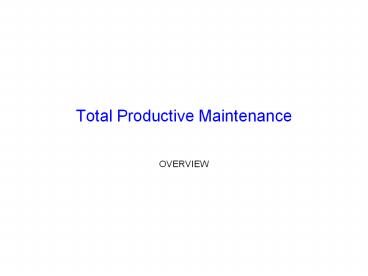Total%20Productive%20Maintenance - PowerPoint PPT Presentation
Title:
Total%20Productive%20Maintenance
Description:
A system of maintenance covering the entire life of the equipment and the total human resource. ... TPM reduces the total life-cycle costs of equipment. ... – PowerPoint PPT presentation
Number of Views:330
Avg rating:3.0/5.0
Title: Total%20Productive%20Maintenance
1
Total Productive Maintenance
- OVERVIEW
2
Aims and Objectives
- Target Audience
- Senior Management
- Purpose of Module
- To understand the need for TPM and the commitment
required to achieve an effective system.. - Aims Objectives
- Explain TPM
- Outline Effective Maintenance
- Outline Autonomous Maintenance
- Q, C, D, P of TPM
3
What is Total Productive Maintenance (TPM)?
4
What is Total Productive Maintenance (TPM)?
- A system of maintenance covering the entire life
of the equipment and the total human resource. - TPM is a tried and tested way of eliminating
waste, saving money and making factories better
places to work. - It gives operators the knowledge and confidence
to manage their own machines. - TPM is a long term process to increase skills,
raise efficiency and achieve zero losses.
Maintenance of normal conditions / Early
discovery of abnormalities / Prompt response
5
What are the benefits of TPM?
- TPM refuses to accept that machine inevitably
fail. - TPM reduces the total life-cycle costs of
equipment. - TPM simply reminds us that every time a machine
fails, something could have been done to prevent
it. - Gradually the operators become maintainers.
- Gradually the maintainers become improvers.
- TPM develops the five senses, as well as
technical skills.
Maintenance of normal conditions / Early
discovery of abnormalities / Prompt response
6
Loss Elimination through TPM?
Equipment
Six Big Losses
7
What is Effective Maintenance?
- PLANNED MAINTENANCE
- The scheduling of maintenance activities on a
time based or usage basis regardless of the
current performance levels of the equipment - PREVENTATIVE MAINTENANCE
- A systematic approach to eliminate
catastrophic failure/breakdowns through regular
care and attention, early diagnosis and
rectification - PREDICTIVE MAINTENANCE
- A systematic approach utilising history and
equipment condition monitoring to predict and
prevent catastrophic failure/breakdowns
Maintenance of normal conditions / Early
discovery of abnormalities / Prompt response
8
What is Effective Maintenance?
- BREAKDOWN MAINTENANCE
- When all else fails ensuring that equipment
availability is achieved in the shortest possible
time whilst eliminating root cause faults with
sustainable repairs - EFFECTIVE EQUIPMENT DESIGN
- A systematic approach to equipment design
which maximises equipment availability, minimises
life cycle costs and eliminates waste
Maintenance of normal conditions / Early
discovery of abnormalities / Prompt response
9
What is Autonomous Maintenance?
- An operator skills development programme.
- Allows problems to be identified and solved
quickly. - Stops accelerated deterioration of plant and
equipment. - An approach to stop deterioration related
failures. - Stabilises equipment conditions (standards).
- Develop training materials on how to run, operate
maintain equipment.
Maintenance of normal conditions / Early
discovery of abnormalities / Prompt response
10
What is Overall Equipment Effectiveness (OEE)?
- Overall Equipment Effectiveness (OEE) is a total
measure of performance that relates the
availability of the process to the productivity
and quality. - OEE is the Key Performance Indicator (KPI) for
TPM. - OEE will measure the impact of change on a
process caused by eliminating process, or
equipment losses. - A World Class Company should achieve 85 OEE on
key equipment
Maintenance of normal conditions / Early
discovery of abnormalities / Prompt response
11
What is Quick Changeover?
- Quick Changeover is a method of analysing and
reducing the time needed to change a process from
producing one good part to producing the next
good part part. - It is a driver for standardisation.
- It is one of the 6 Big Losses.
- Quick changeovers are an enabler for flow.
- Often referred to as Single Minute Exchange of
Die (SMED).
Maintenance of normal conditions / Early
discovery of abnormalities / Prompt response
12
What will TPM do for our business?
IMPROVE HUMAN RESOURCES
IMPROVE PLANT AND EQUIPMENT
IMPROVE CORPORATE CULTURE































